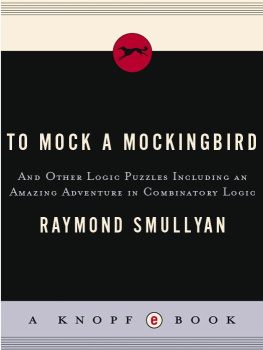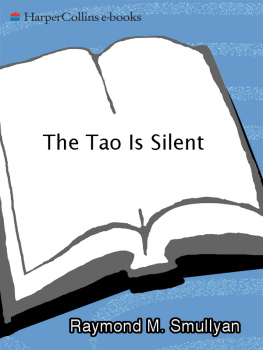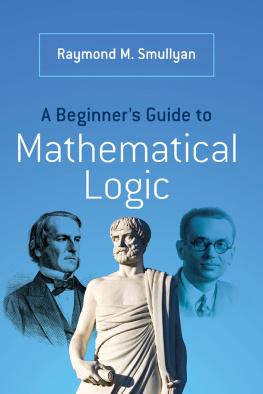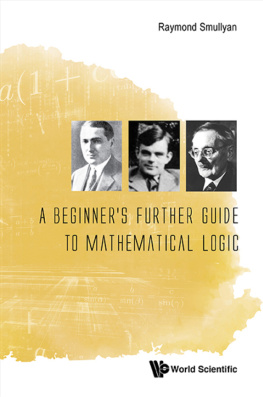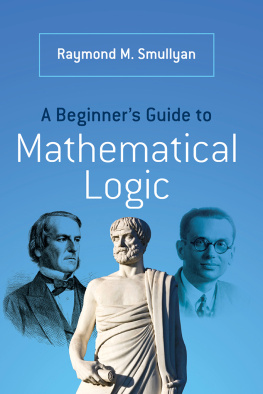Raymond M Smullyan - The Tao Is Silent
Here you can read online Raymond M Smullyan - The Tao Is Silent full text of the book (entire story) in english for free. Download pdf and epub, get meaning, cover and reviews about this ebook. year: 1977, publisher: Harper and Row, genre: Science. Description of the work, (preface) as well as reviews are available. Best literature library LitArk.com created for fans of good reading and offers a wide selection of genres:
Romance novel
Science fiction
Adventure
Detective
Science
History
Home and family
Prose
Art
Politics
Computer
Non-fiction
Religion
Business
Children
Humor
Choose a favorite category and find really read worthwhile books. Enjoy immersion in the world of imagination, feel the emotions of the characters or learn something new for yourself, make an fascinating discovery.

- Book:The Tao Is Silent
- Author:
- Publisher:Harper and Row
- Genre:
- Year:1977
- Rating:5 / 5
- Favourites:Add to favourites
- Your mark:
- 100
- 1
- 2
- 3
- 4
- 5
The Tao Is Silent: summary, description and annotation
We offer to read an annotation, description, summary or preface (depends on what the author of the book "The Tao Is Silent" wrote himself). If you haven't found the necessary information about the book — write in the comments, we will try to find it.
The Tao Is Silent — read online for free the complete book (whole text) full work
Below is the text of the book, divided by pages. System saving the place of the last page read, allows you to conveniently read the book "The Tao Is Silent" online for free, without having to search again every time where you left off. Put a bookmark, and you can go to the page where you finished reading at any time.
Font size:
Interval:
Bookmark:


Part I : What is The Tao?
Chinese Philosophy In a Nutshell
The Tao
Does The Tao Exist?
Yes, But Does The Tao Exist?
The Tao is Vague!
The Tao is Formless
The Tao is a Mysterious Female
The Tao Has No Name
The Tao Does Not Talk
The Tao And The Sage: They Never Argue
I Am Like A Mirror
The Tao Is Everywhere
The Tao Does Not Command
The Tao is Not Arrogant
Worship Of The Buddha
Abiding In The Tao
The Tao Is Ever Spontaneous
The Tao Is Good But Not Moral
Are Men Fundamentally Good?
Whichever The Way
Why Do You Help Your Fellow Man?
Taoism Versus Morality
Is God a Taoist?
The Tao Is Good But Not Moral
The Tao Is Leisurely
On Gardening
On Dogs
On The Art Of Management
On Selfishness
Selfishness and Altruism
On Egotism
Egotism and Cosmic Consciousness
On Trusting Ones Own Nature
On Letting Things Go Their Own Way
On Not Wanting To Amount To Anything
On Making An Effort
The Tao is a Delightful Paradox
Crazy Philosophy And Sensible Philosophy
Wouldnt it Be Funny If
A Dream
Astrology
Two Zen Incidents
Two Versions of a Story
An Imaginary Zen Story
Why Do We Sometimes Misunderstand?
Mondo on Immortality
Do You See The Point?
Enlightenment
The Evening Cool
When the Time Is Ripe

At all costs, the Christian must convince the heathen and the atheist that God exists, in order to save his soul. At all costs, the atheist must convince the Christian that the belief in God is but a childish and primitive superstition, doing enormous harm to the cause of true social progress. And so they battle and storm and bang away at each other. Meanwhile, the Taoist Sage sits quietly by the stream, perhaps with a book of poems, a cup of wine, and some painting materials, enjoying the Tao to his hearts content, without ever worrying whether or not Tao exists. The Sage has no need to affirm the Tao; he is far too busy enjoying it!
from The Tao is Silent
When I first came across the Taoist writings, I was infinitely delighted. I did not feel that I was reading something strange or exotic, but that I was reading the very thoughts I have had all my life, only expressed far better than I have ever been able to express them. To me, Taoism means a state of inner serenity combined with an intense aesthetic awareness. Neither alone is adequate; a purely passive serenity is kind of dull, and an anxiety-ridden awareness is not very appealing. A Chinese friend of mine (of the modern school) recently criticized Taoism as a philosophy of having ones cake and eating it too. I replied, What could be better? He responded, But one cant have ones cake and eat it too! This is precisely where we disagree! All my life I have believed that one can have ones cake and eat it too. Hence I am a Taoist.
Actually, I came to Taoism first through Zen-Buddhism. It took me quite a while to realize to what extent Zen has combined Taoism and Buddhism, and that it was primarily the Taoistic elements which appealed to me. The curious thing about Zen is that it first makes ones mouth water for this thing called Satori (enlightenment) and then straightaway informs us that our desire for Satori is the very thing which is preventing us from getting it! By contrast, the Taoist strikes me as one who is not so much in search of something he hasnt, but who is enjoying what he has.
This is more than a book on Chinese philosophy; it consists of a series of ideas inspired by Chinese philosophy. Though the Taoist viewpoint may be central, this book as a whole treats of a wide variety of subjectsit is really a book on life in general. It is dedicated to my wife, my brother and sister, my puppies, my students, my friends, my readers, and everyone else.
Elka Park, New York R AYMOND M. S MULLYAN
January 17, 1977
A mathematician friend of mine recently told me of a mathematician friend of his who everyday takes a nap. Now, I never take naps. But I often fall asleep while readingwhich is very different from deliberately taking a nap! I am far more like my dogs Peekaboo, Peekatoo and Trixie than like my mathematician friend once removed. These dogs never take naps; they merely fall asleep. They fall asleep wherever and whenever they choose (which, incidentally is most of the time!). Thus these dogs are true Sages.
I think this is all that Chinese philosophy is really about; the rest is mere elaboration! If you can learn to fall asleep without taking a nap, then you too will become a Sage. But if you cant, you will find it not as easy as you might think. It takes discipline! But discipline in the Eastern, not Western style. Eastern discipline enables you to fall asleep rather than take a nap; Western discipline has you do the reverse. Eastern discipline trains you to allow yourself to sleep when you are sleepy; Western discipline teaches you to force yourself to sleep whether you are sleepy or not. Had I been Laotse, I would have added the following maximwhich I think is the quintessence of Taoist philosophy:
The Sage falls asleep not because he ought to
Nor even because he wants to
But because he is sleepy.
There is something blurred and indistinct
Antedating Heaven and Earth.
How Indistinct! How Blurred!
Yet within it are forms.
How dim! How confused!
Quiet, though ever functioning.
It does nothing, yet through it all things are done.
To its accomplishment it lays no credit.
It loves and nourishes all things, but does not lord it over them.
I do not know its name,
I call it the Tao.
Thus writes Laotse some twenty-five hundred years ago. I think this is as good an introductory description of the Tao as can be desired. It raises many interesting questions: Just what is the Tao? How should one define the Tao, or does the Tao elude any possible definition? If it exists, what is it like? What are its properties?
Before turning to these matters, let me tell you the story of a Zen-Master who was asked by a student, What is the Tao? He replied, I will tell you after you have drunk up the waters of the West River in one gulp. The student countered, I have already drunk up the waters of the West River in one gulp. To which the Master replied, Then I have already answered your question.
The Tao is above existence and non-existence.
Existence is for men who use words But the Tao does not use words.
It is as silent as a flower.
Words come from the Taothe Tao produces words,
But it does not use them.
In the trial scene in Alice in Wonderland, the White Rabbit read an obscure verse which was apparently quite irrelevant to the case. The King triumphantly exclaimed Thats the most important piece of evidence weve heard yet. Alice flatly contradicted him and said, I dont believe theres an atom of meaning in it. The King then said, If theres no meaning in it, that saves a world of trouble, you know, as we neednt try to find any.
Font size:
Interval:
Bookmark:
Similar books «The Tao Is Silent»
Look at similar books to The Tao Is Silent. We have selected literature similar in name and meaning in the hope of providing readers with more options to find new, interesting, not yet read works.
Discussion, reviews of the book The Tao Is Silent and just readers' own opinions. Leave your comments, write what you think about the work, its meaning or the main characters. Specify what exactly you liked and what you didn't like, and why you think so.


